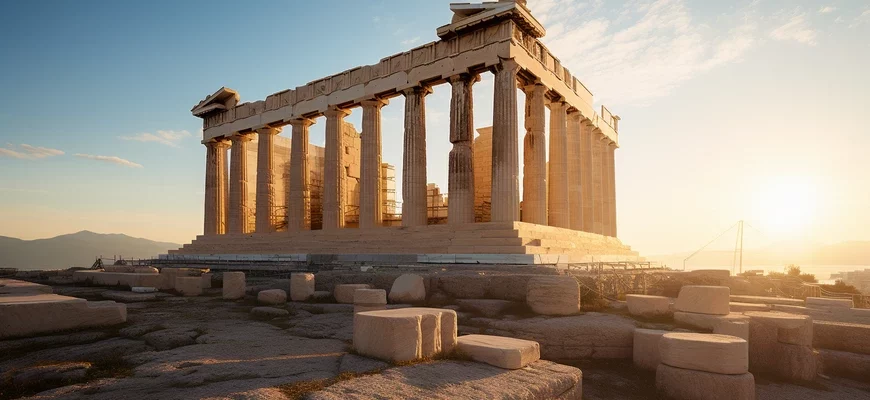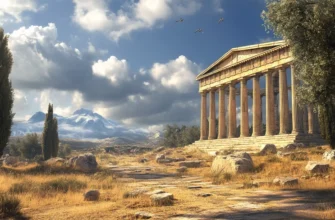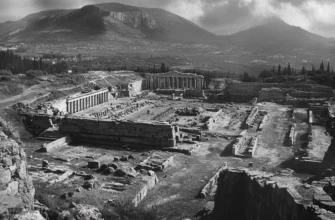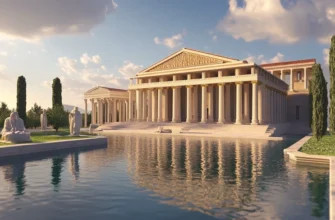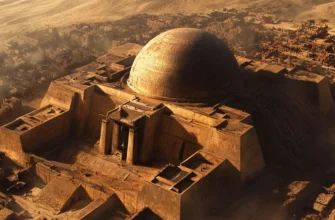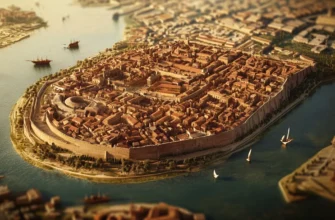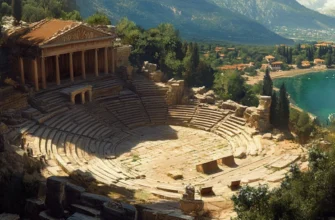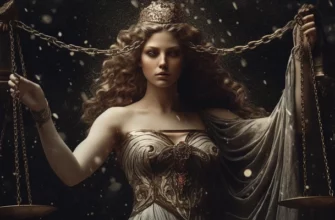Ancient Greece is the period of development of Greek civilization from the 8th to the 4th century BC. The period is divided into the Bronze Age, the Archaic period, the Classical period, and Hellenism. Among the most famous achievements are Athenian democracy, the Macedonian Empire, art and architecture, literature, and philosophy. Ancient Greece left a significant legacy in world culture and civilization.
- Periodization of history
- The Bronze Age
- The Archaic period
- Classical period
- Hellenistic period
- Political history
- Minoan civilization
- Mycenaean civilization
- The period of the ancient Greek city-states
- Athenian democracy
- Macedonian Empire
- Social history
- Spartan society
- The role of women in ancient Greece
- Religious life
- Economy
- Art and architecture
- Literature and philosophy
- Science and technology
- The legacy of Ancient Greece
- Contribution to world culture and civilization
- List of famous figures and their achievements
- Conclusions
Periodization of history
The history of Ancient Greece is divided into four periods:
The Bronze Age (until 1100 BC) was a period when Greek tribes formed and the first settlements were established.
The Archaic period (1100-480 BC) – the period when Greek mythology developed and the first states and city-states were formed.
The Classical period (480-323 BC) – the period of great victories over the Persians and the flourishing of art, science, and democracy in Athens.
The Hellenistic period (323-31 BC) was a period of division of the empire after the death of Alexander the Great and the flourishing of science and culture in late antiquity.
The Bronze Age
The Bronze Age (until 1100 BC) was a period when Greek tribes formed and the first settlements were established in Ancient Greece. At the beginning of this period, peoples migrated to Greece from Anatolia and the North Caucasus. The first settlements appeared, consisting of several houses made of stone, clay, and wood.
During this period, the Greeks were already engaged in agriculture and developing crafts. The first types of bronze weapons appeared, such as swords, spears, and shields. Also at this time, the first myths and legends appeared, which became the basis of Greek mythology.
The Bronze Age ended around 1100 BC with the arrival of the Dorian peoples in Greece, who were known for their new technologies, in particular iron weapons. This led to changes in Greek society and the creation of new forms of economy and government.
The Archaic period
The Archaic period (1100-480 BC) was a period of the formation of state entities in Greece and the development of Greek mythology and literature.
During this period, the process of forming city-states took place, which became the basis of Greek culture and civilization. City-states differed from other states in that they had their own laws, government, and cultural characteristics. The main city-states were Athens, Sparta, Corinth, Thebes, and others.
Greek mythology also developed during this period, becoming the basis for many literary works. The first known poetic works appeared, such as Homer’s Iliad and Odyssey.
During the Archaic period, crafts and trade developed, contributing to the enrichment of the population. However, at this time, there was no single form of government, and power was in the hands of the nobility.
The Archaic period ended with the victory of Athens over the Persians at the Battle of Marathon in 490 BC. This led to changes in the Greek world and the beginning of the Classical period.
Classical period
The Classical period (480-323 BC) was a period of cultural and artistic flourishing in Ancient Greece. During this period, significant changes took place in the political, social, and economic life of Greece.
One of the most important events of this period was the victory of the Greeks over the Persians in the battles of Salamis and Plataea, which allowed Greece to become independent from the Persian Empire. This led to changes in the political system of Greece, including the formation of the Athenian League, which united most of the Greek city-states.
During this period, architecture, sculpture, and painting developed, and such masterpieces as the Parthenon, the statue of Zeus at Olympia, and a ceramic vessel from Athens depicting warriors have survived to this day.
The Classical period was also a time of growing national consciousness among the Greeks and the development of philosophical thought, which manifested itself in the works of philosophers such as Socrates, Plato, and Aristotle.
The classical period ended with the conquest of Greece by Alexander the Great in 323 BC. This marked the beginning of the Hellenistic era, which was characterized by changes in the political and cultural life of Greece.
Hellenistic period
The Hellenistic period (323-31 BC) was a time when Greece was under the rule of Macedonia and later the Roman Empire. This period was characterized by significant changes in the political and cultural life of Greece.
After the conquest of Greece by Alexander the Great, a large Hellenistic empire was created, which combined elements of Greek culture with Eastern traditions. During this period, science, philosophy, and art developed, but they were different in nature compared to previous periods.
Hellenistic culture had a great influence on the development of Roman culture. Many Greek works were translated into Latin, which made them accessible to the Romans. During this period, Greek culture spread throughout the Mediterranean, which was made possible by the growth of trade and the creation of large empires.
The Hellenistic period ended with the conquest of Greece by Rome in 31 BC. At that time, Greek culture was incorporated into the Roman Empire and gradually lost its identity.
Political history
The political history of Ancient Greece was very diverse and complex. During the Archaic period (8th–6th centuries BC), states were organized as monarchies, but over time an aristocracy emerged that believed it had the right to rule the state.
During the Classical period (5th–4th centuries BC), democratic states such as Athens were established. However, there were also other forms of government, such as oligarchy and tyranny.
During the Hellenistic period (323–31 BC), large Hellenistic empires were created, such as the empire of Alexander the Great, which was characterized by centralized power.
During the Roman Empire (1st century BC – 3rd century AD), Greece became a province of the Roman Empire but retained its culture and language. Municipalities were established, in which citizens had the right to elect their representatives.
The political history of Ancient Greece was complex and diverse, but it became the basis for many forms of government in Europe and the world.
Minoan civilization
The Minoan civilization is one of the oldest civilizations in Europe, which developed on the island of Crete in the 2nd millennium BC. During its existence, around 1600-1400 BC, the Minoans created an entire culture with distinctive art, architecture, and writing.
Minoan art used elements such as clay pottery, copperwork, stone carving, and fresco painting. Many of the images on Minoan frescoes relate to mythology and everyday life.
The Minoans were also among the first to engage in maritime trade, which enabled them to develop their own economy. Unfortunately, however, the exact reasons for the decline of the Minoan civilization remain unknown. It may have been caused by an environmental crisis, the consequences of overexploitation of natural resources, or attacks by other peoples.
Despite the lack of information about the Minoans, their culture left a significant mark on the history of art and architecture and became an important source for studying the history of Ancient Greece.
Mycenaean civilization
The Mycenaean civilization was a large and influential civilization located in the Peloponnese region of Greece around 1600-1100 BC. This civilization was named after the city of Mycenae, which became one of the main centers of this culture.
The Mycenaean economy was based on iron ore mining and metalworking. The Mycenaeans created various metal products, such as weapons, jewelry, and other items, which demonstrated their high level of craftsmanship.
The Mycenaeans were also known for their architecture and defensive structures, such as fortresses, walls, and towers. The most famous of their architectural creations is the Leuctra Tunnel, which connected Mycenae with the port of Nauplia.
The Mycenaean civilization declined at the end of the 12th century BC, possibly due to internal conflicts and attacks by Dorian tribes. However, some aspects of Mycenaean culture and technology were inherited by subsequent generations of Greeks, allowing them to develop and create new civilizations.
The period of the ancient Greek city-states
The period of the ancient Greek city-states (8th-4th centuries BC) was marked by the formation of small but self-sufficient city-states known as poleis. Each polis consisted of a city and its surrounding area, which included agricultural land.
Each polis had its own unique political system, but most of them were democratic. Athenian democracy, founded in the 5th century BC, is one of the most famous and important forms of democracy in history.
The culture of the city-states was diverse and multi-layered, with famous artists such as Homer, Sophocles, Aeschylus, and many others. Wars between city-states were quite common, but there were also periods of coexistence and peaceful cooperation.
The city-states played an important role in shaping ancient Greek civilization and influenced the development of politics, philosophy, art, science, and other aspects of culture.
Athenian democracy
Athenian democracy was a political system that existed in ancient Greece in the 5th-4th centuries BC. The system was based on the right of all adult citizens of Athens to vote in popular assemblies and participate in political decision-making.
Democracy was organized on the basis of equal political rights for all citizens. However, this applied only to men; women and slaves were not granted political rights.
The system also included the division of power between various state bodies, such as the popular assembly, the council, the judiciary, and others. The East Market played an important role in the system, where citizens gathered to discuss political issues and exchange news.
Athenian democracy was supported by a fairly developed economy and maritime trade, which ensured a steady flow of revenue to the state treasury. The system also played an important role in the development of politics, philosophy, art, and other aspects of ancient Greek culture.
Macedonian Empire
The Macedonian Empire was a state that existed in Europe from the 4th century BC until its collapse after the death of Alexander the Great in the 3rd century BC. The Macedonian Empire occupied territories from modern Macedonia to India, including parts of modern Turkey, Iran, and Pakistan.
The state was centrally governed, but with local leaders who received their authority from the king. The Macedonian Empire was a military state, and its great power was founded by Alexander the Great, who conquered much of the world in a short period of time.
During the reign of Alexander the Great, Greek and Eastern cultures had a strong influence on Macedonian culture, integrating with it and creating new works of art and literature. Also, during his reign, the Macedonian Empire became the foundation of Christian culture in the East.
After Alexander the Great’s death, the empire fell apart into separate parts, which changed the political landscape in this part of the world. However, it remains important in the history of the East and West because of its huge impact on world culture and science.
Social history
The social history of Ancient Greece reflects the relationships between different social classes in Greek society. In the archaic period, the top of the social pyramid was made up of the landowning aristocracy, the middle classes were made up of urban artisans and merchants, and the lowest class was slaves. In the classical period, social stratification was significant, and there were many changes in the roles of different social groups. In the Hellenistic period, after Alexander the Great conquered the Persian Empire, there was a change in the status of the elite, which led to an increase in the role of trade and manufacturing. After this period, the social history of Ancient Greece continued to develop and change, reflecting the complex dynamics of the society of that time.
Spartan society
Spartan society in Ancient Greece was one of the most famous and unique political entities of the time. Sparta was organized as a military state where discipline and preparation for war were the main priorities. Spartans lived an exclusively military life, where military training and discipline were the most important elements of their culture.
Spartan society was divided into several social classes, with the elite Spartans, who were full citizens and soldiers, at the top. The lowest class were the helots, slaves who provided support for the military class. Sparta is also known for its education system, where boys were given to the state at the age of 7 for military training and education in the spirit of discipline and strict norms.
Spartan society was based on strict discipline and military training, which made it different from other Greek city-states. This also led to the strengthening of Sparta as a military state, but also caused it to influence the social and cultural spheres of the Greek world.
The role of women in ancient Greece
The role of women in ancient Greece was limited. They had no right to vote and could not hold positions in government. The main role of women was to care for children and the household. Girls were raised for marriage, and their main task was to bear children, especially male offspring. However, there were exceptions: for example, in Sparta, women were involved in physical education and could own property. There were also female philosophers and poets, such as Sappho and Hypatia. However, in general, women did not have access to education and culture, which limited their opportunities in society.
Religious life
Ancient Greece was known for its myths and legends about gods and heroes, which were important to the religious life of the Greeks. The religion of ancient Greece was polytheistic, meaning that belief in many gods was widespread.
Gods and goddesses played an important role in the lives of the Greeks. For example, Zeus was the god of the sky and thunder, Poseidon was the god of the seas, Athena was the goddess of wisdom and understanding, Ares was the god of war, and so on. The Greeks believed that gods and goddesses controlled nature and events in people’s lives.
For the Greeks, religion was also associated with shrines and temples. Large and influential shrines were located in Athens, Olympia, and Delphi. Many Greeks came to these shrines to pray and appeal to the gods with requests and supplications.
The Greeks also had a tradition of holding religious celebrations, such as the Olympic Games, which were held every four years in honor of Zeus, as well as the Dionysia, which were celebrated with wine drinking and debauchery.
Overall, religious life in ancient Greece was very important to the cultural and social life of the Greeks and had a major influence on the development of Greek philosophy, literature, and art.
Economy
The economy of ancient Greece was mainly based on agriculture and handicrafts. Greek cities were mostly independent and self-sufficient, so economic activity took place mainly at the local level.
Agriculture was an important part of the economy. Greek farmers grew grains, vegetables, fruits, olives, and grapes, and raised livestock. Although most of the land belonged to the nobility and aristocracy, many farmers also had their own farms.
Craft production was also an important part of the economy in ancient Greece. Craftsmen made various items, such as pottery, weapons, shoes, and clothing.
Trade was also an important part of the economy. Maritime trade allowed the Greeks to access other goods, such as metals, wood, and textiles, which were less available in Greece. The Greeks also manufactured and exported their own products, such as ceramics, wine, and olive oil.
Greek cities were also important centers of trade and markets. Various goods were traded here, such as food, clothing, weapons, and tools for crafts.
In addition, various forms of taxation were developed in ancient Greece, such as taxes on land and crafts. The authorities collected taxes to finance wars, construct buildings, and ensure the functioning of state institutions.
Ancient Greek society was divided into upper and lower classes. The upper class consisted of the nobility and aristocrats, who owned a significant portion of the land and wealth. The lower class consisted of peasants and artisans, who were generally less wealthy and less influential.
The state regulated economic life through laws and political decisions. For example, some cities imposed restrictions on the export of certain goods to preserve them for domestic consumption and ensure price stability.
Ancient Greece also had trading colonies that were established outside mainland Greece. These colonies served to provide access to other regions and resources. They also ensured the expansion of trade networks and maintained links between different Greek cities.
Overall, the economy of ancient Greece was developed and diverse. The Greeks produced and traded a variety of goods, which allowed them to meet their needs and earn income. Various forms of craftsmanship developed in ancient Greece, including the production of ceramics, textiles, weapons, and other goods. Many of these goods were exported to other countries and regions, which ensured the development of trade and the expansion of Greek culture.
Ancient Greece also had a developed financial sector, which included bankers, moneylenders, and other financial institutions. Many of these institutions were concentrated in Athens, where several large banks and financial institutions were located.
Ancient Greece also had various forms of payment, including money, barter, and labor. Most commercial transactions were conducted in cash, but there were also various forms of credit and investment.
Overall, the economy of ancient Greece was developed and diverse. This allowed the Greeks to meet their needs and develop their culture and trade. Many of the technologies and approaches to economics developed by the Greeks are still in use today.
Art and architecture
The art and architecture of ancient Greece are of great importance in the history of world culture. Greek art has its roots in the Minoan and Mycenaean cultures, but the most outstanding works of art were created during the Classical period (5th-4th centuries BC) and the Hellenistic period (4th-2nd centuries BC).
In ancient Greek art, genres such as sculpture, painting, architecture, and mosaics were popular. Sculpture was especially important to the Greeks, who created many famous sculptures, including statues of David and Apollo.
The architecture of ancient Greece was based on a perfect balance between beauty and functionality. The most famous architectural monuments of Greece are the Doric and Ionic temples, which have clean lines and proportions. The main elements of Greek architecture include columns, capitals, and dimensions.
Greek painting was mainly figurative art rather than portraiture. However, many of the epic scenes depicted realistic heroes who reflected the spirit and ideals of Greek culture.
Mosaics were used as decoration for floors and walls in ancient Greece. They were complex in design, using different colors and geometric shapes.
Overall, the artistic creations of ancient Greece are of great importance to the development of world culture. Many of Greece’s works of art have UNESCO cultural heritage status and are visited by thousands of people from all over the world.
One of the most famous examples of Greek architecture is the Parthenon, a magnificent Doric temple in the center of Athens, built in the 5th century BC. The temple is a testament to the cultural and historical significance of ancient Greece, and its beauty and symmetry amaze tourists from all over the world.
Another important element of ancient Greek architecture is the theaters, which were popular venues for national celebrations and performances. Ancient Greek theaters were comfortable for spectators and also had excellent acoustics and luxurious decorations.
In terms of art, one of the most famous works is the bronze statue of Poseidon, located in the National Archaeological Museum in Athens. This impressive sculpture depicts Poseidon, the god of the sea and the waves, holding a trident in his hands.
Another outstanding work of art is the mosaic from Delphi, dating from the 4th century BC. This mosaic depicts the famous Greek legend of Icarus and Daedalus and is an example of the technical skill and artistic talent of the ancient Greeks.
Considerable attention was also paid to the paintings on vases. Greek vases were made from various materials, such as clay, metal, and glass. They were decorated with drawings depicting mythological scenes, competitions, and other events. One of the most famous types of Greek vases is the red-figure vase, which appeared in the 5th century BC. Artists applied red drawings on a black background, which gave the vases a special beauty and elegance.
Ancient Greek art also included sculpture, which depicted gods, heroes, and ordinary people. Sculptors used various materials, such as stone, bronze, and clay. They depicted the human figure in various poses, conveying details of clothing, footwear, and other elements. One of the most famous works of ancient Greek sculpture is the statue of David by Praxiteles, which depicts a young hero in a pose that expresses calm and confidence.
Mosaics were also an important element in ancient Greek art. Mosaics were used to decorate floors, walls, and other surfaces. They consisted of glass and stone crystals that were glued together to form various patterns and ornaments. One of the most famous examples of Greek mosaics is the mosaic from Alexandria, which depicts animals, birds, and plants.
In general, the art and architecture of ancient Greece are a great achievement of world culture. They reflect the thinking and aesthetic ideas of ancient Greek society and serve as evidence of the high level of development of this culture.
The architecture of ancient Greece is particularly famous for its temples. Greek temples were built in the Doric, Ionic, and Corinthian styles. They consisted of columns that supported a public hall. The columns were arranged in rows, which ensured the stability of the building and created beautiful geometry. One of the most famous Greek temples is the Parthenon on the Acropolis in Athens.
Greek architecture was also notable for its theaters. Greek theaters were open and semi-circular in shape. The amphitheater-style seating provided good visibility for the audience. Greek theaters were the venue for dramatic performances and tragedies, such as the works of Aeschylus, Sophocles, and Euripides.
It is also worth mentioning mosaics, which were popular in ancient Greek art. Mosaics were used to decorate floors, walls, and other surfaces. They consisted of glass and stone crystals that were glued together to form various patterns and ornaments. One of the most famous examples of Greek mosaics is the mosaic from Alexandria, which depicts animals, birds, and plants.
All these elements of art and architecture reflected the deep philosophical and cultural ideas of ancient Greek society. For example, one of the most important principles of Greek architecture was the idealized representation of beauty and harmony. This principle also reflected the idea of symmetry and order in all aspects of life.
Greek art was also famous for its depictions of the human figure. Greek sculptures were made of marble and bronze and depicted the ideal human form. The sculptures were rendered with realistic details such as muscles and skin tones. One of the most famous examples of Greek sculpture is the Parthenon statues, which depicted Athena and other gods and heroes.
In addition, Greek art also depicted religious and mythological themes. Greek myths and legends were depicted on vases, terracotta figurines, and other art objects. Such works of art helped to preserve and pass on the cultural traditions and history of the Greek people.
In general, the art and architecture of ancient Greece reflected the high level of development of this culture, its aesthetic ideas, and philosophical principles. They became an integral part of world culture and continue to inspire artists and architects to this day.
Literature and philosophy
Literature and philosophy in ancient Greece are considered one of the most important components of its culture. Greek literature was highly developed and included legends, poems, tragedies, and comedies.
One of the most famous Greek poets was Homer, who lived in the 8th-7th centuries BC. His works, “The Iliad” and “The Odyssey,” are considered cultural treasures of ancient Greece. These epic poems told of the exploits of heroes and reflected mythological themes.
Greek tragedy and comedy also had a huge influence on world literature. The tragedies written by Aeschylus, Sophocles, and Euripides told the stories of heroes and reflected the problems of human life and ethics. The comedies written by Aristophanes were funny works that showed the social problems of ancient Greece and sharply criticized political leaders.
Ancient Greek philosophy also had a major influence on culture and world history. Philosophers such as Socrates, Plato, and Aristotle put forward new ideas and concepts about human nature, morality, and society. They questioned the meaning of life and the role of humans in the world.
The most important idea in Greek philosophy was the idea of understanding the world through reason. Philosophers believed that the world could be understood and described through reason, rather than through intuition or religion, as was the case in most other cultures. They also believed in a rational order in the universe and the possibility of achieving truth through mental activity.
Socrates was one of the most famous philosophers of ancient Greece, who practiced the method of questions and answers. He taught his students to think for themselves and develop critical thinking. His student, Plato, became one of the most influential philosophers in the world. He wrote many dialogues in which he examined problems of philosophy and politics.
Another influential philosopher was Aristotle, who developed Plato’s ideas and introduced many new concepts. He believed that knowledge could be attained through observation and research, and he developed a theory of logic and the scientific method.
In ancient Greece, ideas from Eastern philosophical systems, particularly from India and Persia, also developed. These ideas were reflected in the philosophies of Stoicism and Epicureanism.
All of these ideas and concepts had a great influence on the further development of philosophy, literature, and culture as a whole. They have been preserved and passed on to subsequent generations, allowing us today to study and improve our knowledge of ancient Greece.
Science and technology
Science and technology were an integral part of ancient Greek culture. The ancient Greeks developed mathematics, astronomy, mechanics, physics, and other sciences.
One of the most famous mathematicians of ancient Greece was Pythagoras. He developed the famous Pythagorean theorem about right-angled triangles. Another famous mathematician was Euclid, who wrote the famous book “Elements,” which became the foundation of geometry as a science.
In astronomy, the ancient Greeks believed that the Earth was the center of the universe, but many of their observations and calculations were correct. One of the most famous astronomers of ancient Greece was Aristarchus. He studied the motion of the planets and discovered new patterns in nature.
In the field of mechanics, Archimedes developed Archimedes’ principle, which explains why floating bodies do not sink in water. He also developed a well-known mechanical device known as a lever and studied the motion of bodies and forces.
The ancient Greeks also made significant contributions to physics. Democritus developed the concept of atoms, which formed the basis of modern chemistry and physics. Hippocrates developed the concept of medicine, which included observation, diagnosis, and treatment.
The ancient Greeks developed not only science but also technology. For example, they made glass windows, used complex mechanisms to lift heavy loads, and created water supply and drainage systems.
In architecture, the ancient Greeks are known for their columns. They created various architectural styles, such as Doric, Ionic, and Corinthian. Many of their structures, such as the Parthenon on the Acropolis in Athens, remain examples of exquisite art and engineering to this day.
It is also worth mentioning that the ancient Greeks developed games and sports. The most famous of these were the Olympic Games, which were held every four years in the city of Olympia in honor of Zeus, the chief god of the Greeks. These games became a symbol of peaceful competition and spiritual unity among the ancient Greeks.
Overall, ancient Greek science and technology had a significant impact on the development of the world. Many of their discoveries and ideas have been passed down to our time and are used in modern technology and science.
The legacy of Ancient Greece
The legacy of Ancient Greece is one of the most influential and valuable in world culture. Greek culture and ideas have influenced the development of philosophy, art, literature, science, politics, and many other aspects of life.
In literature, Ancient Greece left us such masterpieces as Homer’s Iliad and Odyssey, the tragedies of Aeschylus, Sophocles, and Euripides, and the dramatic works of Aristophanes, Plato, and Aristotle. In philosophy, ancient Greek thinkers such as Plato, Aristotle, Socrates, and Epicurus formed the foundations of philosophical thought and ethics that are still used today.
Ancient Greek art, particularly architecture, left us with elegant columns such as the Parthenon on the Acropolis in Athens. Ancient Greek art is also known for its exquisite vases and sculptures, such as the statue of Zeus at Olympia and the Parthenon in Athens.
In science and technology, the ancient Greeks made many discoveries and contributed significantly to the development of science, engineering, and mathematics. For example, Ptolemy compiled data on the stars and constructed a model of our galaxy, Archimedes discovered Archimedes’ principle and created complex mechanisms for lifting heavy loads, and Hippocrates created much of the knowledge used in medicine to this day.
The ancient Greek heritage is also present in politics and democracy. Ancient Greece was the first country where the idea of democracy emerged. In city-states such as Athens, government was exercised by popular assemblies, where every citizen could express their opinion and make decisions.
Greek mythology also influenced the culture and art of the entire world and became an important part of world literature and art.
All this makes Ancient Greece an extremely important cultural heritage that has influenced many aspects of life in the modern world and helps us understand the history of humanity and our own culture.
Contribution to world culture and civilization
Ancient Greece’s contribution to world culture and civilization is enormous and significant. Here are some of the most important aspects:
Philosophy: Greek philosophers such as Socrates, Plato, and Aristotle became the fathers of Western philosophy. Their ideas and teachings became the foundation of modern philosophical and scientific thought.
Art: Greek art made an enormous contribution to world culture. Greek sculptures, architecture, and drawings became examples of classical art that influenced art around the world for many centuries.
Literature: Greek literature made an enormous contribution to world literature. Homer, Aristophanes, and Aeschylus became examples of classical literature, and their works are still studied in universities around the world today.
Mathematics and science: Greek mathematicians and scientists made great contributions to the development of mathematics and science. They were the first to apply logic and mental operations to solve complex problems.
Democracy: Greek democracy was the first form of representative government, where citizens had the right to express their opinions and make decisions. This idea was revived in many countries, including the United States, where democracy became the basis of government.
Ancient Greece had a huge impact on world culture and civilization, and its contributions can still be felt today. Here are some of the important achievements of the ancient Greeks:
Democracy: Ancient Greece is considered the birthplace of democracy, where citizens had the right to vote and participate in decision-making in the state. This idea of democracy is still the basis of many modern democratic systems around the world today.
Philosophy: The ancient Greeks developed philosophy, which became one of the most influential ideas in world culture. Philosophers such as Socrates, Plato, and Aristotle developed ideas about morality, ethics, politics, science, and religion that continue to influence the world to this day.
Literature: Ancient Greek literature, such as the poetry of Homer, the tragedies of Aeschylus, Sophocles, and Euripides, the comedies of Aristophanes, and the historical works of Herodotus and Thucydides, influenced world literature and culture, including English literature of the Renaissance and Romanticism.
Mathematics and science: The ancient Greeks made significant contributions to the development of mathematics and science, with inventors such as Euclid, Archimedes, and Ptolemy giving the world the principles of geometry, mechanics, and astronomy.
The culture and civilization of Ancient Greece remain extremely important and influential to this day. Its contribution to world culture and civilization has been significant in many fields, such as philosophy, science, art, literature, politics, sports, and many others.
The philosophy of Ancient Greece remains a key component of Western philosophy and influences our understanding of the world and our place in it. Philosophers such as Socrates, Plato, and Aristotle made significant contributions to the development of philosophical concepts about human nature, ethics, politics, science, and metaphysics.
In the field of science, the contribution of Ancient Greece was extremely significant. The achievements of Greek scientists in fields such as mathematics, astronomy, physics, medicine, and others not only laid the foundations for these sciences but also influenced scientific development as a whole.
The art of Ancient Greece is also considered an important part of world culture. They created many masterpieces of art, such as sculpture, architecture, painting, and literature. Their style and technique remain influential to this day, and we can see them in building design, art, and design.
One of the most important legacies of Ancient Greece is its democratic ideals and political culture. Greek philosophers and historians made significant contributions to the development of political thought and systems of government, including republican forms of government, the legal system, and public dialogue.
Ancient Greece also made significant contributions to the development of literature, art, architecture, mathematics, science, and medicine. Many of these achievements became the starting point for the further development of civilization.
For example, Greek architecture and art remain among the most remarkable in the world and continue to inspire architects, artists, and designers around the world. The philosophical principles of Plato, Aristotle, and other Greek philosophers became the basis for the development of philosophy, science, and morality, and their ideas became the starting point for the development of Western culture.
In addition, Greek medicine is considered one of the first health sciences to combine theory and practice. Many of the developments of Greek physicians, such as Hippocrates, remain important to this day.
Thus, the legacy of Ancient Greece was significant and influenced the development of world culture and civilization, leaving its mark on art, science, philosophy, politics, and many other fields.
List of famous figures and their achievements
Ancient Greece produced many outstanding figures whose legacy lives on today. Here are a few of them and their achievements:
Socrates (469-399 BC) was a philosopher who founded the Sophistic school of thought. He is known for his method of questioning, which was aimed at understanding the essence of things. Socrates played an important role in the development of Western philosophy and is a model of wisdom and intellect.
Plato (427-347 BC) was a student of Socrates and founder of the Academy in Athens. He is known for his dialogues, which cover a wide range of philosophical issues, from politics to ethics. His influence on European philosophy, politics, and culture was great and unforgettable.
Aristotle (384-322 BC) was a student of Plato and a scholar who made significant contributions to the development of philosophy, science, and logic. He founded his own school, the Lyceum, and wrote numerous works, including Politics, Nicomachean Ethics, and Physics. Aristotle is considered one of the most famous and influential people in the world.
Homer (9th century BC) was a poet and author of the Iliad and the Odyssey, two of the most famous works of ancient Greek literature. His works not only became outstanding examples for later Greek writers, but also influenced world literature, especially epic poetry.
Herodotus (c. 484-c. 425 BC) was an ancient Greek historian known for his work “The Histories,” which describes the Greco-Persian Wars and other historical events. Herodotus is considered the “father of history.”
Euclid (c. 300 BC) was an ancient Greek mathematician and author of Elements, one of the most famous books on geometry. Elements was the standard textbook for geometry for over 2,000 years.
Archimedes was a famous scientist, mathematician, physicist, and engineer who made a great contribution to the development of mechanics and hydrodynamics. He invented many devices, such as the screw pump, complex mechanisms for lifting water, and much more.
Pythagoras was a famous mathematician and philosopher who founded a religious and philosophical doctrine known as Pythagoreanism. He was also involved in mathematics and music, believing that numbers have special properties.
Phidias was a famous sculptor who worked in the 5th century BC. He is known for creating many magnificent sculptures, such as the Parthenon and the Olympian Zeus.
Conclusions
The history of Ancient Greece is the history of a great civilization that formed in the territory of modern Greece, as well as on the shores of the Mediterranean Sea and beyond. This civilization made a significant contribution to the development of world culture, science, and technology.
Among the key achievements of Ancient Greece are the development of democracy, the invention of the alphabet, the development of philosophy and science, the flourishing of art and architecture, and the contribution to the development of Olympic sports.
The main states of Ancient Greece were Athens, Sparta, Corinth, Thebes, and Megara. Each of these states had its own history and culture.
Ancient Greece experienced many wars and conflicts, both with its own states and with other peoples, including the Persians and Macedonians. However, despite this, the Greeks managed to preserve their culture and ideals, which have been passed down through the centuries and became the foundation for many subsequent cultures and civilizations.
All these factors make Ancient Greece an important stage in world history and allow researchers to learn about and understand the past of our civilization.
